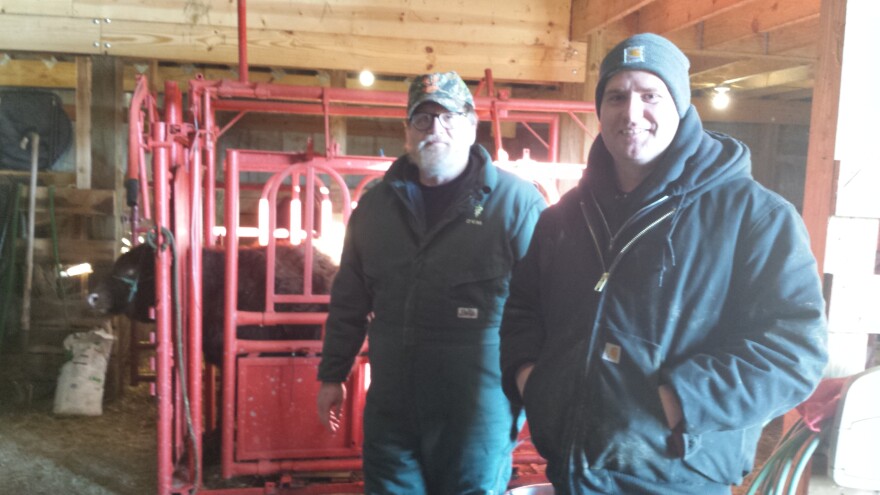Across the U.S., a growing number of rural communities are facing a growing veterinarian shortage, that is expected to worsen in coming years. These regions are in need of veterinarians that specialize in livestock animals and public practice.
To combat this growing problem, the American Veterinary Medical Association is trying to encourage more veterinarians to practice in underserved areas with the help of the Veterinary Medicine Loan Repayment Program, which provides selected food animal and public health veterinarians up to $75,000 in loan repayment in exchange for serving at least three years in a federally-designated shortage area.
County Lines Producer Renee Wilde rides along with a country veterinarian to talk about that shortage.
I’m sitting in the passenger seat of the pick-up truck that serves as the mobile office for Veterinarian Dr. Scott Hosket, who's on a routine farm call to castrate a calf.
"I graduated from Ohio State, College of Veterinary Medicine, in 1978," he says. "And then I went to Wisconsin. Well, I was up there from ‘78 to ‘81 and then I moved back here to Ohio."
Dr. Hosket is considered a mixed-animal practice vet, which means that he divides his time between treating small animals like dogs and cats in his clinic, and traveling between farms, like this afternoon, to treat large animals ranging from horses, cows, goats, pigs and llamas.
"So typically it’s small animal surgery from 8 a.m. to 10 a.m., and then I like to leave space open for large animal, but I’ll have small animals 11 a.m. to noon, and then in the afternoon I’ll have two- three hours of large animal and two hours of small. So I try to finish up at six o’clock, but invariably I end up getting called out after six ."

We get to the first farm, and Dr. Hosket opens the covered truck bed, gathering up everything he needs for the procedure. Most of the equipment is easily recognizable; syringes, bandages, stethoscope. But there’s a whole pile of specialty large animal tools that look more like something you might find in a hardware store.
When we enter the barn for that castration procedure, the steer is tightly enclosed in a metal holding pen so that he can’t move around and hurt himself, or us. The soon-to-be former steer surges against the pen as, Dr. Hosket works with the efficiency of a man who’s been doing this for the past 40 years. The entire procedure takes less than 10 minutes, and we’re back in the truck, and on to the next farm call.
In addition to these scheduled farm visits, Dr. Hosket also does emergency calls for large animals, which typically happen after office hours, especially during the winter months when most livestock are having their babies.
"I mean at one time, from January to March, I spent 13 hours a day, I didn’t even eat dinner with my family for, I think it was one hundred and ten days," he says. "There’s some nights, about once a month, every couple months, I’m so exhausted, that at eleven o’clock, I just turn my phone off."
That's one of the reasons that new veterinarians don’t want to go into a large animal practice.
"There is a shortage of large animal vets, that’s what I tell people, there’s a shortage at two o’clock in the morning," says Dr. Hosket. "Some of them do not want to work over 40 hours a week. They don’t want to do emergencies. Plus they’re coming out with $160,000 debt."
In Ohio, twenty nine counties located in the southern parts of the state are feeling the vet shortage, and nine of those counties have no veterinarian practices.
We arrive at our second farm call to treat a pet goat named Jackson.
"It’s been about nine years since you were here," says Jackson's owner Rich. "I’m glad you’re not retired. I don’t know who I would have called, really. A lot of them don’t like to come out anymore."
Dr. Hosket is turning 65 this year, but he has no intention of retiring anytime soon.
"I do enjoy it still, but, it is getting harder and it’s getting real tiring," he says. "The other night I had a dog that really took a bad turn, wasn’t responding to any treatment, and I actually brought it in the house, it bothered me so much. I only got about two hours sleep. I kept waking up and checking on the dog. It ended up passing away. I think the day comes...if it doesn’t bother me, a pet dying...if it doesn’t bother me that much, then that might be the time. But when the time comes, I’m gonna quit cold turkey. I’ll have a sign on my door 'gone fishing.'"
And when the time does come for him to hang up his “gone fishing” sign, hopefully a new generation will be there to continue his work.
County Lines is WYSO’s new series focusing on small towns and rural communities in the Miami Valley and beyond. Community Voices producer Renee Wilde travels down the highways and back roads to bring WYSO listeners stories of country life that go beyond the stereotypes. County Lines is made possible by a generous grant from Ohio Humanities.


